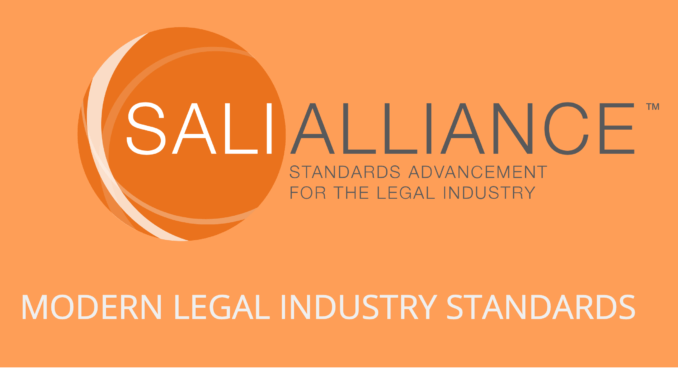
The Standards Advancement for the Legal Industry Alliance (SALI) has announced today at the LegalTech Conference in New York that it has completed the final revision of the Legal Matter Specification Standard (LMSS), designated as LMSS 1.0.
This version represents a development milestone in providing legal matter data interoperability that can aid in the buying and selling of legal services and drive greater efficiency, the organisation said.
And, as Artificial Lawyer highlighted on Monday, matter/price standardisation is going to be essential if we are to really benefit from the changes taking place through better use of human talent, process improvement and design, and legal technology.
‘Through the hard work of our core working group, and broad support by many in the industry, the LMSS 1.0 release represents a milestone for the SALI standard,’ said Toby Brown, SALI Board Member, and chief practice management officer at Perkins Coie. ‘It is rewarding to see the standard available for wide use for the pursuit of legal industry innovation.’
Chris Ende, chief value officer at Goulston & Storrs, added: ‘Like many other firms, we have grappled with the challenge of trying to derive meaning from our firm-specific matter taxonomy.
‘We were excited to participate in the development of the first standard for describing matters in the legal industry, and are thrilled to see it released today. This collaboration among parties across the legal ecosystem represents a groundbreaking milestone for the industry in terms of quality, consistency and transparency.’
About LMSS 1.0
Through its development over the last three years, LMSS 1.0 provides a common language for describing legal matters in a party-neutral, extensible manner by a wide array of stakeholders in the legal industry. As organizations apply analytics to their legal data, LMSS provides a common starting point for the interchange of information.
This standard includes the publication of a modern overall structure, as well as more than a dozen code sets, including Area of Law, Legal Services, Courts and Governmental Bodies (both U.S. only presently), Industries, Organisations, Locations and Player Roles. The standard’s design supports other jurisdictions, and active projects are underway in several countries to design codes applicable to their legal matters. LMSS is an open, free standard, available for review at https://salilegal.org.
—
About the SALI Alliance
The SALI Alliance is all-inclusive for firms, clients, organisations, industry technology and service providers. SALI originated to ensure all stakeholders in the industry have a voice to shape the most useful and relevant standards that will foster transparency.
The SALI Alliance members include: the Association of Legal Administrators (founding member), the International Legal Technology Association (founding member), the Legal Marketing Association (founding member), Allen Matkins, Barnes & Thornburg Bloomberg Law, Clifford Chance, Cox Automotive, Fish & Richardson, GSK, Goulston & Storrs, Greenberg Traurig, Honigman, Miller, Schwartz and Cohn, Humana, Intapp, King & Wood Mallesons, Level 2 Legal Solutions, LexisNexis, McKool Smith, Mishcon de Reya, Pepper Hamilton, Perkins Coie, Prosperoware, Schulte Roth & Zabel, Shearman & Sterling, Shell, Thomson Reuters, Waller Lansden Dortch & Davis, WilmerHale, Winston & Strawn, and Wolters Kluwer. SALI endorsers include the Association of Corporate Counsel, Baker Donelson, Buying Legal, Citigroup, Edge International, Foundation Software Group, LawVision, Institute of Legal Project Management, LegalShift LLC, Microsoft. LEDES is an allied partner. Microsoft announced that it is piloting the standard as a first user at ILTACON 2019.
2 Trackbacks / Pingbacks
Comments are closed.